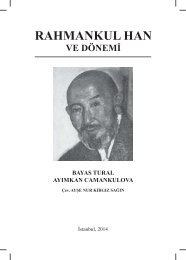THE SOVIET HISTORIOGRAPHY AND THE QUESTION OF KAZAKHSTAN’S HISTORY
SOVYET-TARIH-YAZICILIGI-ENG
SOVYET-TARIH-YAZICILIGI-ENG
Create successful ePaper yourself
Turn your PDF publications into a flip-book with our unique Google optimized e-Paper software.
<strong>THE</strong> <strong>QUESTION</strong> <strong>OF</strong> <strong>KAZAKHSTAN’S</strong> <strong>HISTORY</strong> 143<br />
was the one who resisted with his works without submission”.<br />
Several years before, in 1946, S. Mukanov’s novel “Our Time’s Hero”,<br />
G. Musiperov’s story “Private Kaptagay”, Tilevov’s poem “Syrym Batyr”<br />
and M. Avezov’s novel “Poet Brother” were published in the magazine<br />
“Adebiyat zhane Iskustvo” and evaluated as soft works without significant<br />
political affiliation. In April 1953, M. Avezov was forced to go to<br />
Moscow. He began to work at M. Lomonosov Moscow Public University<br />
as professor and lectured about the “USSR Public Literature History”.<br />
On the event commemorating the 90 th birthday anniversary of M.<br />
Avezov, the prominent Kazakh poet O. Suleymanov said “During the<br />
zenith of the Alashorda-Nationalist accusations, during the chaotic<br />
1930s, Avezov surprisingly survived. Despite these difficult times, he<br />
never gave up championing Abay”. 243<br />
M. Avezov’s persecution affected his students as well. On 9 March<br />
1951, at the Kazakh SSR Academy of Sciences Language and Literature<br />
Institute’s Scientific Committee, the young academic Kayym Muhamedkhanov’s<br />
dissertation “Abay’s Poesy School”, under the supervision<br />
of M. Avezov, was evaluated. This dissertation, defended on 7 April<br />
1951, was later dismissed. Moreover, A. Zhyrenshin’s book, “Abay and<br />
his Russian Friends”, faced the same fate.<br />
The arrest of E. Bekmakhanov initiated the stage of persecution of<br />
historians, men of letters, and statesmen. Subsequently, the accusations<br />
against E. Bekmakhanov were directed to the others as well.<br />
Labelled as nationalists, the music researcher A. Zhubanov, Abay<br />
researcher M. Avezov, and the authors S. Mukanov, K. Zhumaliev, E.<br />
Ismailov, A. Zhirenshin, and A. Margulan faced persecution as well.<br />
That is, the persecutions of that time prove the oppression on the<br />
grounds of nationalism against Kazakh Turks. Pressure on intellectuals<br />
also affected the museums. At the meeting concerning Abay, a decision<br />
was made about revising the activities of the Abay museum in Semey<br />
and the elimination of the “nationalist-motivated, anti-revolutionary”<br />
elements in the museum. 244<br />
On 16 March 1949, an article titled “Bourgeois Cosmopolitans at<br />
Universities” was published in the journal “Kazakhstanskaya Pravda”.<br />
On 20 March of the same year, a similar article was published in this<br />
journal and targeted several Kazakh authors by stereotyping them as<br />
“degenerate cosmopolitans, traitors”.<br />
243 Qapayeva, A., Kultura i Politika (Gosydarstvennaya politika v oblasti kultury v Kazahstane<br />
vo vtoroy polovine 1940-h – 1991gg.), Almatı, Atamura, 2004, p. 328 , p. 53.<br />
244 Düysenova, N., Qazaqstandagı XX Gasırdın 40-50 Jıldarındagı “Ultşıldıq” pen “Kosmopolitşıldıqqa<br />
Qarsı Küres Nayqanı, Almatı, 2006, p. 150, p. 148-149.



